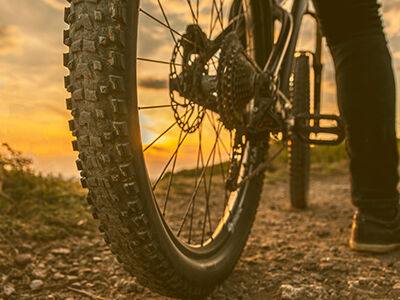Mountain Biking Guide

Mountain biking is a sport which uses a specially designed bicycle to travel up, down, and across rough terrain of all sorts.
Cross country, freeride, trail riding, downhill, street riding, and dirt jumping and all normally done using a mountain bike, which is a type of cycle specially designed to be able to take the extra strains that come with such activities whilst still being comfortable for the rider.
Most mountain bikers use their cycles for cross country cycling, which is covered under most Cycle Insurance policies. Generally, cyclists who go cross country mountain biking will have a different set of needs to those who use their bicycle for commuting. A mountain bike is more likely to suffer accidental damage whilst being ridden, if the user crashes or falls whilst riding cross country there are a number of different types of hazard involved.
Cross country riding can often end up leading the cyclist further from their home address, and if a breakdown or damage to the cycle happens at such a time, it can be quite a trek back home. Some Cycle Insurance policies offer a breakdown service, to help get you back home if your bike cannot be easily repaired. Most mountain bikers will carry some form of repair kit though, so minor damage such as a puncture can be easily repaired temporarily.
Personal Accident cover becomes especially important with mountain biking, as there is an increased danger of severe injury in certain situations and difficult terrain. Whilst it is unlikely that these injuries could prove fatal or result in a permanant disablement, knowing that you have cover in place can help to give you peace of mind.
Safety
To reduce the risk of injury if you do suffer a fall or accident whilst mountain biking, it is highly recommended to wear some protective clothing;
-
Helmet
A helmet is vital in any cycling situation, but perhaps more so when going cross county as there are many different types of terrain that could cause a fall. A helmet will help to protect your head from injury. -
Gloves
Gloves are normally stronger than standard cycling gloves and are designed to protect the hands from injury if you come off your cycle on rough terrain. -
Glasses
Glasses are designed to prevent any objects entering your eye. With mountain biking this can be especially important as there can be numerous insects, branches or dust that can get into your eyes causing an accident or damage to the eye. -
Body Armour
Protective body armour will help to reduce or prevent injury if you do fall in rough terrain. Ranging from simple knee and elbow pads to full chest armour with spinal support, there is plenty of choice available. You will need to make your own decision as to how much protection you need, depending on the type of mountain biking you will be doing and the terrain you will be riding across. -
First Aid Kit
Carrying a first aid kit is recommended. If you do suffer a fall or an accident that leads to a cut or abrasion, your first aid kit will allow you to dress the wound temporarily until further medical aid can be sought. More serious injuries may require further medical attention at the scene, and remember never to move someone who has injured their spine.
However you decide to use your mountain bike, and whatever protection and safety equipment you use, it is important to ensure that you only ride in an area you are comfortable with. The highest risk of injury comes from attempting downhill runs or jumps that are above your experience level, so these are best avoided. It can aslo be a good idea to cycle with a friend, so that if you do have an accident there is someone there to help.
Cycle Insurance will be very useful to mountain bikers, as if you do damage the cycle whilst riding or the cycle is stolen, you can claim on your insurance. Mountain bikes can often be higher value than standard road cycles such as those used for commuting, due to the different structures and the various upgraded features incorporated into their designs.
Of course, there is nothing to stop you Using Your Bicycle For Commuting during the week, and then using it to cycle cross country at the weekend!
Be sure to check out our Road Safety Tips and Bicycle Security Guide before getting your Mountain Bike Insurance quote?